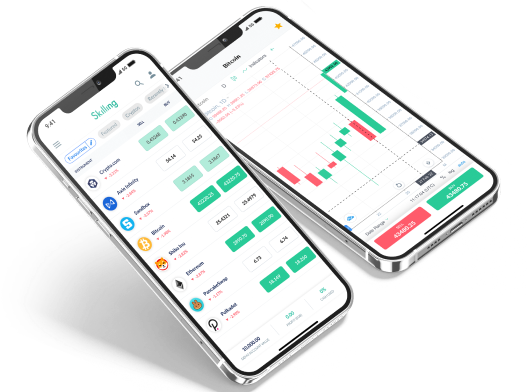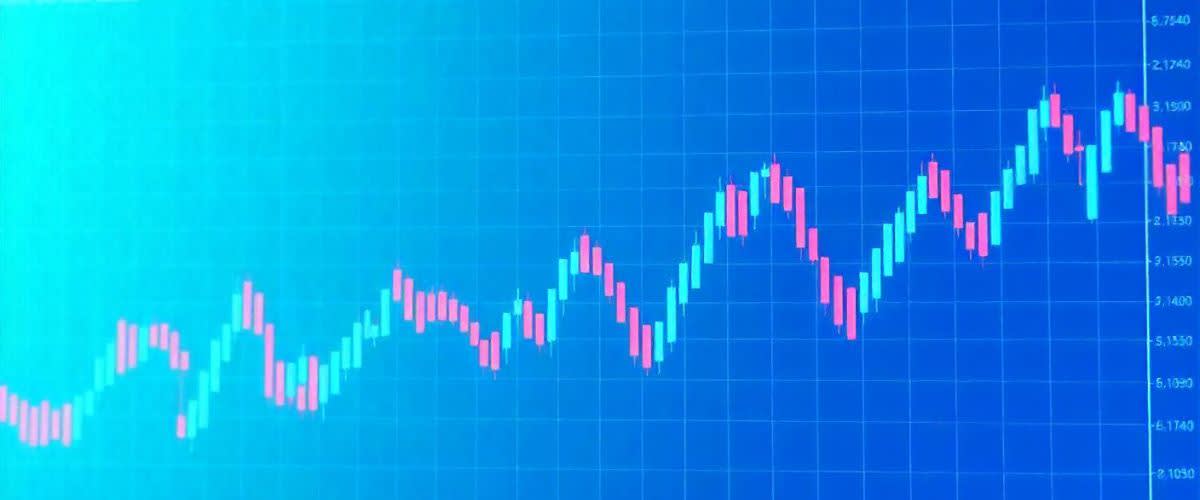Trendlines are a fundamental tool in technical analysis, used by traders to identify and confirm trends in the financial markets. By drawing a line that connects two or more price points, traders can gain insights into the direction and strength of market movements. Understanding how to effectively use trendlines can help traders make more informed decisions and improve their trading strategies.
In this article, we will explain what a trendline is, how it can be used in trading, its advantages and disadvantages, and why Skilling is an excellent platform for trading.
Practice with a Demo Account
Try our demo account and experience real market conditions.

What is a trendline in a trading chart?
A trendline is a straight line drawn on a trading chart that connects two or more price points. It helps to visually represent the direction of the market trend. There are two main types of trendlines:
- Uptrend line: This is drawn by connecting the low points of an asset's price over time. It indicates that the price is generally moving upwards.
- Downtrend line: This is drawn by connecting the high points of an asset's price over time. It indicates that the price is generally moving downwards.
Here is an image of a trading chart showing both an uptrend and a downtrend line. The uptrend line connects the lows in green, and the downtrend line connects the highs in red, illustrating the concept of price movements within a market.

What does a trendline tell you when trading?
Trendlines provide valuable insights into the market's direction and strength. Here's what they can tell you:
- The direction of the trend: Trendlines clearly show whether the market is in an uptrend, downtrend, or moving sideways. This helps traders align their strategies with the prevailing market direction.
- Support and resistance levels: In an uptrend, the trendline acts as a support level, where the price tends to bounce back up after touching the line. In a downtrend, the trendline acts as a resistance level, where the price tends to fall back after touching the line.
- Trend strength: The steepness of the trendline can indicate the strength of the trend. A steeper line suggests a stronger trend, while a flatter line indicates a weaker trend.
Experience Skilling's award-winning platform
Try out any of Skilling’s trading platforms on the device of your choice across web, android or iOS.

Pros and cons of trendlines
Understanding the benefits and limitations of trendlines can help traders use them more effectively. Here’s a summary:
| S/N | Pros | Cons |
|---|---|---|
| 1. | Simplicity: Easy to draw and understand | Subjectivity: Different traders may draw trendlines differently |
| 2. | Trend identification: Clearly shows the direction of the trend | False breakouts: Prices may temporarily break the trendline, leading to false signals |
| 3. | Support and resistance: Helps identify key levels for entry and exit | Lagging indicator: Reflects past price movements and may not predict future trends |
| 4. | Versatility: Can be used in various markets and time frames | Requires multiple points: Needs at least two points to draw, which may not always be available |
Why trade with Skilling?
Trading with Skilling offers several advantages that can enhance your trading experience:
- User-friendly platform: Skilling provides an intuitive and easy-to-use platform that is suitable for both beginners and experienced traders.
- Low fees: Skilling offers very low trading fees, allowing you to maximize your profits.
- Wide range of instruments: With Skilling, you can trade a variety of instruments, including stocks, Forex, commodities, and indices.
- Educational resources: Skilling provides a wealth of educational resources to help you improve your trading skills and knowledge.
- Advanced tools: The platform offers advanced trading tools, including charts, technical indicators, and analysis tools, to help you make informed decisions.
For instance, understanding the gold price and using trendlines can help you make strategic trading decisions.
Summary
Trendlines are a powerful tool in technical analysis, helping traders identify trends, support, and resistance levels. While they have their limitations, their simplicity and effectiveness make them a valuable addition to any trader's toolkit. Trading with Skilling can further enhance your trading experience with its user-friendly platform, low fees, and comprehensive educational resources.
FAQs
1. What is a trendline in a trading chart?
A trendline is a straight line drawn on a trading chart that connects two or more price points, indicating the direction of the market trend.
2. What does a trendline tell you when trading?
Trendlines show the direction of the trend, act as support and resistance levels, and indicate the strength of the trend.
3. What are the pros and cons of trendlines?
Pros include simplicity, trend identification, and versatility. Cons include subjectivity, false breakouts, and being a lagging indicator.
4. Why should I trade with Skilling?
Skilling offers a user-friendly platform, low fees, a wide range of instruments, educational resources, and advanced trading tools.
5. How can trendlines improve my trading strategy?
Trendlines help you identify market trends, support, and resistance levels, allowing you to make more informed and strategic trading decisions.











